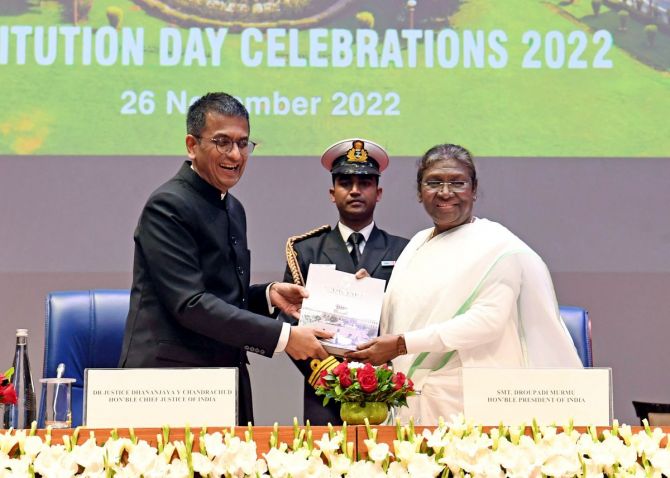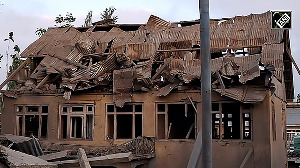'The (Collegium system of appointing judges) is absolutely whimsical.'

"Let Parliament make another appropriate law in consonance (with the Judiciary) so that it is fair and there's credibility in the system (of appointment of judges)," retired Delhi high court judge Justice R S Sodhi tells Prasanna D Zore/Rediff.com about the ongoing stand-off between the Judiciary and Executive over the Supreme Court Collegium. The concluding segment of a two-part interview.
- Part I of the interview: 'Judiciary has hijacked the Constitution'
Chief Justice Dr D Y Chandrachud recently spoke about the Basic Structure Doctrine of the Constitution. Why do you think did the CJI spoke about the Basic Structure even as a public spat continues between the Supreme Court and the government over appointment of judges, their recommendations and the rejection of recommended names by the government?
What is the Basic Structure of our Constitution?
That there are very clear demarcations related to separation of powers; of duties and responsibilities enshrined in the Constitution, for the three pillars -- the Executive, Legislature and Judiciary -- of Indian democracy.
Duties and responsibilities to not appoint yourself. But that's what the Judiciary has been doing. Is it in concurrence with the Basic Structure (doctrine of the Constitution)?
The Basic Structure Doctrine also says that you are sovereign in your sphere (that all the three arms of the Indian State are sovereign in their own spheres). You cannot over-ride each other and none of you are beyond the Constitution. That's how the framers of our Constitution wanted the Indian Republic to work.
What is the Basic Structure? Nobody knows; nobody's answered it. It can't be imaginary or based on whims and fancies.
What is the Basic Structure? Who has defined it? Where has it been defined?
Why do you say that the Judiciary and Executive shouldn't mistrust each other? Why do you think that that is the case?
Didn't I already say that the Judiciary cannot function on its own? It has to take the other limbs together.
All the three (limbs) have to function together and in unison. One cannot discard the other saying these people are all unworthy of trust, and the other side saying that you are unworthy of trust, after all you also just appointed yourself.
Who's going to measure your trustworthiness?
Would you justify the comments made by the Union law minister and the vice president about how the judiciary appoints itself?
These remarks (by the law minister and the VP) are not made ofF the cuff. There is a reason for making those remarks by the vice president (and the law minister). After all, Parliament unanimously passed the (National Judicial Appointments Commission) bill and then it became an Act.
The Supreme Court struck down (the NJAC) resorting to the power of judicial review and maintaining that independence of the Judiciary has been violated (by the passage of the NJAC Act).
Now the question is what independence are you talking about? Is the Supreme Court Collegium system (of appointing judges to the high courts and Supreme Court by the judiciary itself ) independent? Will every department of the government now appoint itself and will that become independent?
What kind of independence (do) you (want)? There's no absolute independence. You are dependent on each other.

What troubles you the most about how the Supreme Court Collegium appoints judges?
The fact that it (Collegium system of appointing judges) is absolutely whimsical; that there is no fair criteria (to appoint judges).
Just three people sitting in the Supreme Court (the Collegium consists of five senior-most judges of the Supreme Court, including the Chief Justice) cannot decide how judges are appointed.
There is no standard or fair criteria (of appointment of judges); it is (the appointments of judges to the high courts and Supreme Court) based on just whims and fancies.
Where is this stand-off heading?
It better not be a (prolonged) standoff. Both of them better become sensible and let Parliament make another appropriate law in consonance (with the Judiciary) so that it is fair and there's credibility in the system (of appointment of judges).
What is your final word in this stand-off?
Both of you be sensible and don't wash your dirty linen in the public.











 © 2025
© 2025